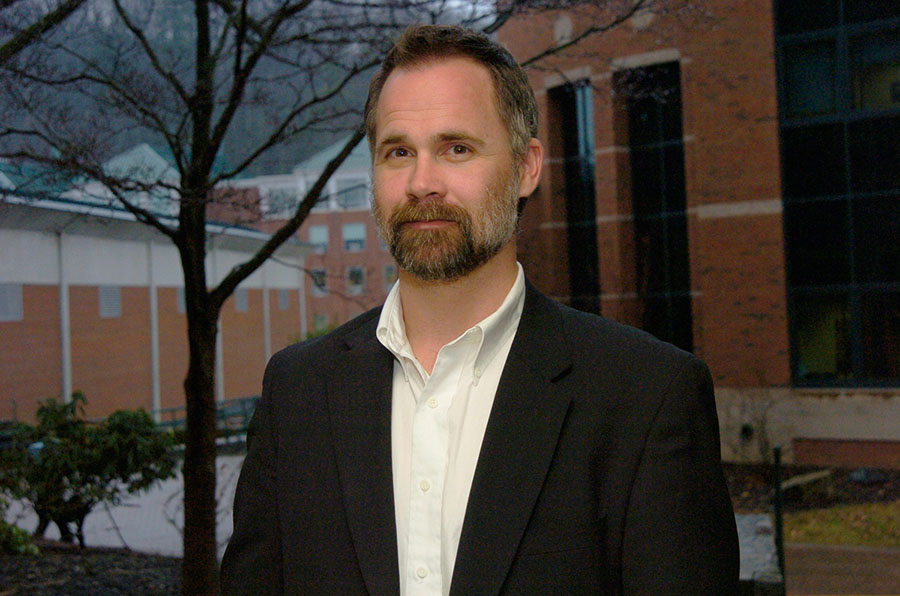BOONE — Noted Latin American scholar Dr. Timothy J. Smith has received a visiting fellowship in Princeton University’s Program in Latin American Studies. He will be a visiting research scholar and visiting assistant professor for fall 2012.
Smith is an assistant professor in Appalachian State University’s Department of Anthropology.
He said the fellowship would enable him to engage in research that will lead to scholarly publications, and enhance his classroom instruction.
“As a teacher this is a wonderful opportunity to engage with a different cohort of students to enhance and further develop my skills,” Smith said. “By augmenting my own research experiences and affording me the opportunity to further develop other projects, I can bring this experience, and information and knowledge produced back to the classroom for undergraduates at Appalachian.”
Smith expects to teach a course on environmental citizenship and indigenous identity in Latin America. The rest of his time at Princeton will be devoted to research and completing a book project on that topic.
“A teacher who doesn’t engage in research, I think, is half of a teacher. And likewise a research scholar who doesn’t teach is half of a scholar,” he said. “That’s one of the wonderful things about Appalachian State. We have a teacher/scholar model born out of the belief that teaching is lacking if one doesn’t have those research experiences.”
Princeton’s library has an extensive collection of materials related to Latin America, and its proximity to other institutions means that Smith will also be able to conduct research in the archives of libraries at Columbia University in New York, the University of Pennsylvania in Philadelphia, and have access to rare books and manuscripts written in Latin American indigenous languages that are housed in philosophical societies in the Philadelphia area.
“Tim is an excellent scholar with an international reputation. This fellowship benefits not only Tim; our department benefits immensely whenever our faculty have a chance to conduct research or engage with scholars from other universities,” said department chair Dr. Diane Mines.
“Our faculty bring back with them a fresh and lively engagement with anthropological theory and research, which feeds our program in several ways: faculty hear about our colleagues’ work, and learn and gain inspiration from it; faculty return ready to teach new classes or infuse existing classes with new ideas or results of research; and our undergraduate majors are often recruited into new research work by the faculty,” she said.
Princeton has one of the first programs in the United States dedicated solely to Latin American area studies. “It’s a stellar university and obviously the resources there are unparalleled,” Smith said. “I am so grateful that Appalachian State University supports faculty who pursue fellowships such as this. It shows that we value not only teaching, but research as well.”
Student engagement in faculty research also benefits the department’s growing reputation as a vital and strong undergraduate program with top-notch faculty, Mines said. “We know that this reputation—and the knowledge and experience upon which it’s founded—enhances our students’ chances for acceptance into Ph.D. and M.A. programs at top universities and it enhances our own name recognition when we apply for competitive research grants or recruit new faculty.”
Smith is the author of “Ethnicity Unplugged: Indigenous Elections and Political Subjectivity in Highland Guatemala,” for which he has received a contract from the University of Alabama Press. He is co-editor of “Mayas in Postwar Guatemala: Harvest of Violence Revisited” and “After the Coup: An Ethnographic Reframing of Guatemala 1954.” Smith also co-edited a bilingual text on the cultural history of Sololá, Guatemala, and the town’s indigenous leadership. The book was provided to school children in the town.
Prior to coming to Appalachian, Smith was a visiting scholar at Columbia University and a visiting fellow at Harvard University. He received a Fulbright Research Grant in 2001-02 for fieldwork in Sololá, Guatemala. He annually leads a study abroad trip to Ecuador to conduct field interviews and other research.
Smith is the latest in a series of successful fellowship recipients in the Department of Anthropology who have been able to use these prestigious awards for research, including those given by Fulbright and the National Endowment for the Humanities.
What do you think?
Share your feedback on this story.
About the Department of Anthropology
The Department of Anthropology offers a comparative and holistic approach to the study of the human experience. The anthropological perspective provides a broad understanding of the origins as well as the meaning of physical and cultural diversity in the world — past, present and future. Learn more at https://anthro.appstate.edu.
About the College of Arts and Sciences
The College of Arts and Sciences (CAS) at Appalachian State University is home to 17 academic departments, two centers and one residential college. These units span the humanities and the social, mathematical and natural sciences. CAS aims to develop a distinctive identity built upon our university's strengths, traditions and locations. The college’s values lie not only in service to the university and local community, but through inspiring, training, educating and sustaining the development of its students as global citizens. More than 6,800 student majors are enrolled in the college. As the college is also largely responsible for implementing App State’s general education curriculum, it is heavily involved in the education of all students at the university, including those pursuing majors in other colleges. Learn more at https://cas.appstate.edu.
About Appalachian State University
As a premier public institution, Appalachian State University prepares students to lead purposeful lives. App State is one of 17 campuses in the University of North Carolina System, with a national reputation for innovative teaching and opening access to a high-quality, cost-effective education. The university enrolls more than 21,000 students, has a low student-to-faculty ratio and offers more than 150 undergraduate and 80 graduate majors at its Boone and Hickory campuses and through App State Online. Learn more at https://www.appstate.edu.












